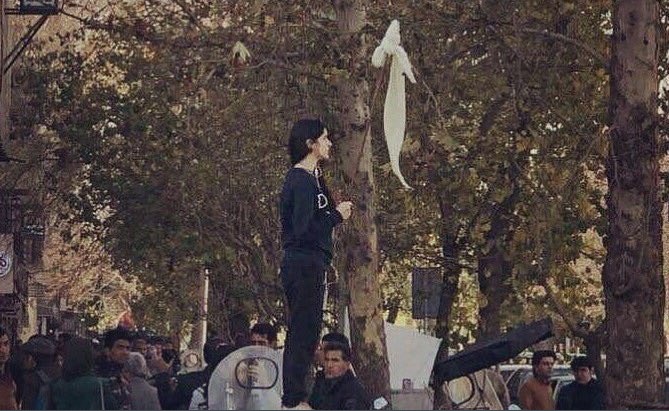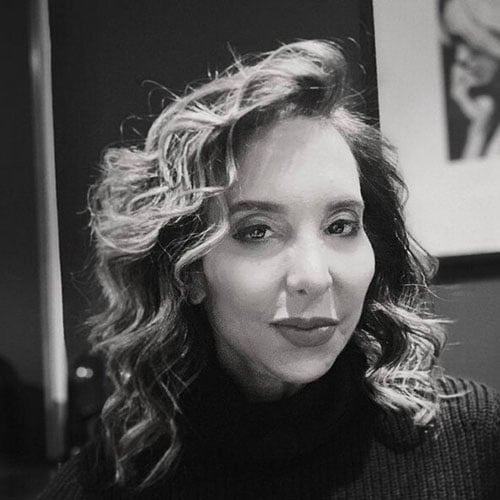 Screenshot from Twitter.
Screenshot from Twitter. An iconic photo has emerged from the protests in Iran. A young woman — fearless, determined, resolute — holds a long stick. At the end of the long stick is a white hijab. The image is so powerful it was morphed into digital art, which then became a social media meme. But it is a meme with no words, no hashtag.
Because a cry from the heart needs no hashtag.
Sadly, as I write this five days into the protests, most people probably haven’t seen the image. It hasn’t been splashed on all the front pages of the world. Indeed, at least in the beginning, much of the media ignored or downplayed the largest protests in Iran since 2009. There has been a deafening silence from leftist groups that purport to be about human rights and feminism.
Maybe we shouldn’t be surprised. The god of leftism, President Barack Obama, set the stage when he took the side of the tyrannical dictatorship during the 2009 protests, and then, as part of the Iran deal, gave the terror-happy regime billions of dollars in cash.
The Iranians have no interest in victimhood and are throwing off the hijab with abandon.
Eight years later, faced with the agonizing cries of a people desperate for freedom and human dignity, the left is failing again. Many are trying to protect Obama’s legacy; most will do anything not to be on the same side as President Trump, who has thrown his support squarely behind the protesters.
Perhaps the larger issue is this: Iran puts in high relief the difference between real liberalism, in which principles transcend politics; and leftists, who live in fear of helping their ideological enemies and offending the victims du jour.
Linda Sarsour and her fellow travelers have sanctified this antiliberalism through endless manipulation and propaganda. In one surreal moment, she was able to convince women on the left that wearing the hijab was a symbol of “empowerment.”
But here’s the funny thing about this Persian Spring: the Iranians have no interest in victimhood and are throwing off the hijab with abandon. Day after day, the brave Persians are showing the world what real liberalism looks like.
Mesmerized by the protests, I keep thinking of a song from the new movie “The Greatest Showman.” The movie itself is an homage to non-conformity and non-victimization, but one song in particular, “This is Me,” describes the sentiment that first inspired feminism and liberalism:
We are bursting through the barricades/And reaching for the sun (we are warriors)/Yeah, that’s what we’ve become/Won’t let them break me down to dust/I know that there’s a place for us/For we are glorious.
In the film, set in the late 19th century, the song is an anthem to human dignity, respect, tolerance and a classless society where anyone can achieve greatness.
In 2018, it can be seen as an anthem to freedom, justice, individualism and the classical liberalism now reborn with the Iranian protesters.
While Sarsour has convinced the left to make victims the new dictators — she recently announced that Palestinians have a right to become terrorists — the Iranian people are done with dictatorship, terrorism (notably, the protesters shouted: “Death to Hezbollah”) and fundamentalism.
Sure, some women may choose to wear a hijab, just like women in other religions choose to dress modestly. But since 1979 Iranian women were not given this choice. They were forced to wear the hijab, as well as to accommodate the craziness of the mullahs in every aspect of their lives, or they were lashed and imprisoned. Meanwhile, Islamic clerics regularly hang gay men, even teens.
The world has watched a vibrant country be destroyed by Islamic fundamentalism, and now, the world watches a people rising up to say, “Enough.”
Were the protesters inspired by the U.S. standing up to Islamic dictators over Jerusalem? Perhaps indirectly. Freedom has a way of sending out waves of positive energy, as we saw with the collapse of the Soviet Union.
We can mark the start of 2018 optimistic that a ray of courage has emerged from an ancient people who have, overall, a positive relationship with another ancient people — the Jews. And we can hope and pray that the evil mullahs will be gone before Purim.
Karen Lehrman Bloch is a cultural critic and author.























 More news and opinions than at a Shabbat dinner, right in your inbox.
More news and opinions than at a Shabbat dinner, right in your inbox.